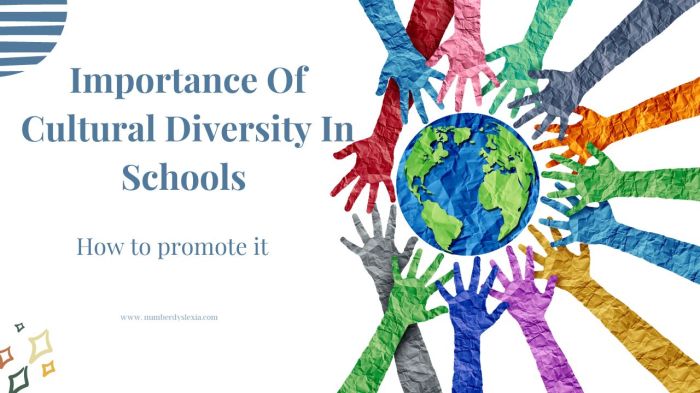Importance of cultural diversity in education is paramount in creating a rich and inclusive learning environment. By embracing various cultural perspectives, students can develop a deeper understanding of the world around them, leading to enhanced empathy and critical thinking skills.
Exploring the benefits of integrating cultural diversity in curriculum reveals the transformative power of multicultural education in preparing students for a globalized society.
Importance of Cultural Diversity in Education

Cultural diversity plays a crucial role in shaping the educational experience of students. It goes beyond just celebrating different traditions and languages; it also enhances learning outcomes in various ways.
Enhanced Learning Experience
Exposure to diverse cultures in the classroom provides students with a broader perspective on the world. It allows them to see things from different angles and challenges their preconceived notions. This exposure fosters open-mindedness and critical thinking skills, preparing students to navigate an increasingly globalized society.
- Students learn to appreciate and respect different cultural backgrounds, promoting a sense of empathy and understanding.
- Exposure to diverse perspectives encourages creativity and innovation in problem-solving.
- Collaboration among students from different cultural backgrounds leads to the exchange of ideas and experiences, enriching the learning process.
Impact on Critical Thinking Skills, Importance of cultural diversity in education
Culturally diverse classrooms create a dynamic environment where students are constantly exposed to new ideas and ways of thinking. This exposure challenges students to think critically and analyze information from multiple viewpoints.
By engaging with diverse perspectives, students develop the ability to evaluate information critically and make well-informed decisions.
- Students learn to question assumptions and biases, leading to a more nuanced understanding of complex issues.
- Diversity in the classroom encourages students to think independently and consider alternative solutions to problems.
- Exposure to diverse cultures enhances students’ communication skills, as they learn to navigate different communication styles and cultural norms.
Benefits of Integrating Cultural Diversity in Curriculum

Integrating cultural diversity into the curriculum offers numerous benefits for students, enriching their educational experience and preparing them for a globalized world.
Enriching Students’ Knowledge
Cultural diversity in the curriculum exposes students to a wide range of perspectives, traditions, and ways of thinking. By learning about different cultures, students gain a deeper understanding of the world around them and develop empathy and respect for others. This exposure broadens their knowledge base and helps them become more well-rounded individuals.
Preparing for a Globalized World
Multicultural education equips students with the skills and mindset needed to thrive in an increasingly interconnected world. By learning about diverse cultures, customs, and languages, students are better prepared to navigate cross-cultural interactions and collaborations. This global perspective is essential for success in today’s diverse and competitive workforce.
Promoting Inclusivity and Equity
Culturally relevant teaching plays a crucial role in promoting inclusivity and equity in schools. By incorporating diverse perspectives into the curriculum, educators create a more welcoming and inclusive learning environment for all students. This approach helps address systemic inequalities and ensures that all students feel represented and valued in the educational setting.
Learn about more about the process of Importance of early childhood education in the field.